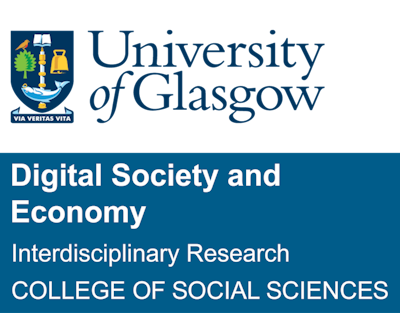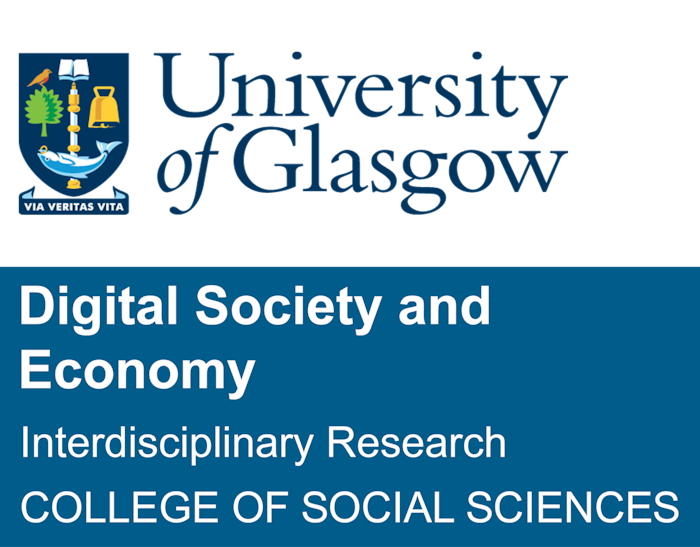
Customers, consumers and end-users as FinTech innovators?
Thursday, November 30, 2023
Advanced Research Centre (ARC), University of Glasgow, Glasgow, United Kingdom

Customers, consumers and end-users as FinTech innovators?
Thursday, November 30, 2023
Advanced Research Centre (ARC), University of Glasgow, Glasgow, United Kingdom
What you need to know
This event is part of the 'Regenerating Scottish productivity for prosperity for all' programme of events for National Productivity Week, funded by the ESRC - check out the full programme below:
Regenerating Scottish productivity for prosperity for all
29th Nov - The Triple Bottom Line and AI - new ways of thinking about productivity
29th Nov - Journey to Prosperity: Productivity and Innovation with Dr Anna Valero
30th Nov - New perspectives on productivity: scale deep, crowdfunding and purposeful business
30th Nov - Customers, consumers and end-users as FinTech innovators? Reflections on the Consumer Duty
1st Dec - Innovation, place and communities: innovation districts, partnerships and communities of innovation
---
To celebrate the National Productivity Week, The Productivity Institute Scotland Forum and the IRT Digital Society and Economy at the University of Glasgow have teamed up to bring you an event on "Customers, consumers and end-users as FinTech innovators? Reflections on the Consumer Duty".
This event is brought to you by the Innovate UK-funded Financial Regulation Innovation Lab at the University of Glasgow.
FinTech focuses on innovation. The focus is often on the development, production and marketing of new, often disruptive, products and services. End-users, consumers and customers have been less in focus.
In policy and regulation, there is a growing recognition of the role that consumers play in expanding and drawing out the potential benefits of FinTech and financial services, of establishing a Fintech for good. The UK Financial Conduct Authority introduced the Consumer Duty in July 2023, as a contribution to support consumers, adding resilience and growth to the market. We observe similar initiatives internationally.
Famously, Adam Smith in the Wealth of Nations, reflected on the division of labour as a vital and dynamic process of economic growth requiring the interplay of specialising and coordinating. The division of labour is limited by the extent of the market. Corporate growth, scale, competition, entry, and their coordination, depend on the growth of the market. This means end-users, customers and consumers joining the market too, bringing their expertise and capabilities into the mix.
Research, broadly on lead-users in innovation, and increasingly in consumer research, demonstrates that consumption is rarely a near-automated release of the benefits of a product (good or service). Rather consumption is often a skilled set of learning and practices.
How do we give these a safer place in financial markets?
Agenda:
13:00-13:15 - Arrivals and registration
13:15-14:00 - Perspectives from practice and policy
- Chair: Bridgette Wessels, Professor of Social Inequalities at University of Glasgow
- Dorothy Hamilton, ex-Global Head of Securities Services Operations, HSBC; and Scottish President of the Chartered Institute for Securities and Investments
- John Finch, Professor of Marketing at University of Glasgow
- Ruari Scullion, Associate Partner at PEN Partnership
- Patrick Ring, Reader, Glasgow School for Business and Society, Glasgow Caledonian University
- James Syron, Partnerships Manager at DirectID
- Ren Yi Hooi, Founder and CEO, Lightning Reach
- Rachel Curtis, CEO of Inicio
14:00-14:30 - Discussion
This event is funded by the ESRC.
Speakers
John Finch, Professor of Marketing at University of Glasgow
John joined the Adam Smith Business School in October 2012 as Marketing Professor. Previously he was Marketing Professor at the University of Strathclyde, where latterly he was also Vice Dean (Knowledge Exchange) for Strathclyde Business School. John began his academic career as Lecturer in Economics at the University of Aberdeen, having completed his PhD at Lancaster University Management School. John’s research interests are in Market Studies, which is the application of actor network theory, science and technology studies and ethnography to understanding the interactions of markets and their broadly economic exchanges.

Ruari Scullion, Associate Partner at PEN Partnership
A management consultant with expertise across the financial services sector. Specific areas of interest include: The Future of Work, Sustainable Investing, Strategy & Operations, Change & Transformation

Patrick Ring, Reader, Glasgow School for Business and Society, Glasgow Caledonian University
Patrick is a qualified solicitor who worked in the corporate area of private practice and thereafter with a large life assurer before entering academia. His work spans both the theoretical and practical, looking particularly at retail financial services and their regulation, as well as risk and risk culture. Patrick has published in a wide range of journals including Journal of Social Policy, Economy and Society, Policy & Politics and Critical Social Policy. His 2020 paper with colleagues on COVID-19 published in the Journal of Risk Research is in the Journal’s top 3 most read articles of all time.

Dorothy Hamilton, ex-Global Head of Securities Services Operations, HSBC
Ex-Global Head of Securities Services Operations, HSBC; and Scottish President of the Chartered Institute for Securities and Investments.

James Syron, Partnerships Manager at DirectID
James Syron is a data and technology specialist in credit risk who has delivered value to large enterprise organisations in the financial services and automotive sectors. He has led the Product teams at both TransUnion and Experian, two of the leading credit bureaus in the UK. He currently works for DirectID, a global open banking company that provides bank transaction data to improve credit decisions and enables lenders to offer more inclusive lending services. James has a customer-focused, commercially astute and technically aware approach that has earned him industry awards for his innovative solutions. He is passionate about empowering consumers to control their data and launched one of the UK’s first Current Account data sharing solutions, which won the ‘Best New Technology’. He is well-versed in the regulatory and risk management aspects of data and technology, such as the Payment Directives, Consumer Duty and GDPR.

Ren Yi Hooi, Founder and CEO, Lightning Reach
Ren Yi Hooi is the Founder and CEO of Lightning Reach, a financial support portal which makes it easy for people to find and apply for a wide range of personalised support in one place. She is one of the WISE100 2023 top women in social enterprise and Women in FinTech Powerlist 2022. Ren was previously the Product Director at Railsr, a leading FinTech scaleup. Passionate about using technology to drive social impact and financial inclusion, she led international teams as Country Manager for BIMA, a global InsurTech provider for the financially underserved. Ren holds an MBA from The Wharton School of the University of Pennsylvania and a B.A. from UC Berkeley. She is currently a Senior Visiting Practitioner at the University of York’s Administrative Fairness Lab and a recipient of the UK’s Tech Nation Exceptional Talent Visa.

Rachel Curtis, CEO of Inicio
Rachel has spent 30 years in the Financial Services arena including at Santander and then as Chief Customer Officer for a challenger bank. She still sits as a Non-Executive Director for a regional Building Society, holding the role of Consumer Duty Board Champion. In 2021 Rachel made the switch to lead a Fintech start-up that has a B2B software platform that uses conversational AI to help organisations better help their customers complete detailed affordability assessments.

Chair: Bridgette Wessels, Professor of Social Inequalities at University of Glasgow
Bridgette's research focuses on social exclusion and digital divides, financial exclusion and the e-economy, social media and political inequality, health inequalities and telehealth, welfare services and (digital) identity, local journalism and inclusion and e-policing, ethnicity and communities. She is also addressing the developing uses of open and big data in open services and data-driven science.

How To Get Here
The ARC (Advanced Research Centre) is located at 11 Chapel Lane, Glasgow, G11 6EW.
The event will take place on the Ground Floor in Seminar Room 237. Signage will be present to direct you once you enter the venue.
You can find directions to the ARC on Google Maps or please use this link which will provide directional videos from three nearby locations.
For more information on how to get to the University of Glasgow can be found on this page. You may also find this link helpful.
Paid parking is available at Kelvin Hall and is just a short walk away from The ARC but spaces are limited; you should therefore make your way to UofG by public transport where possible.
Accessibility
Step – free access
The ARC building has step free access and all rooms participating in this event are on the ground floor.
Toilets
Accessible and ambulant toilets are available throughout the building, as are gender neutral toilets. There is a Changing Places toilet located on Level 1, the lower ground floor. Please ask a member of the events team who will be happy to direct you.
Assistance dogs
Assistance dogs are welcome and water bowls can be provided at Reception.
Induction loops
All microphones in the building work in conjunction with an infrared hard of hearing system. Please ask a member of the events staff if you require assistance.
Blue Badge parking and drop off
The closest Blue Badge parking bay is located on University Place. Please contact the event organiser in advance if you need to arrange accessible drop off and parking immediately next to the ARC and we will be happy to assist you.
--



Location
Advanced Research Centre (ARC), University of Glasgow
11 Chapel Ln, Glasgow, G11 6EW United Kingdom
When
- Thursday, November 30, 2023 1:00 PM
- Timezone: United Kingdom Time
- Add to calendar
Organiser
- University of Glasgow
- See more from University of Glasgow
- Terms and privacy policy
